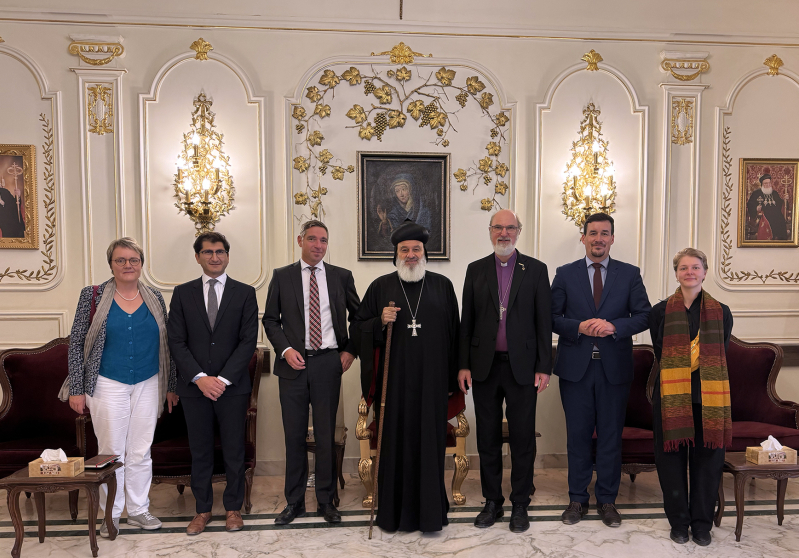
Leaders of the International Society for Human Rights (ISHR) met Monday (Oct. 6) with His Eminence Ignatius Aphrem II, Syriac-Orthodox Patriarch of Antioch and All the East, in Damascus to discuss the challenges facing Syria’s Christian communities following the country’s first parliamentary elections since the fall of the Assad regime.
In a report shared with Christian Daily International, ISHR said its President Archbishop Prof. Thomas Schirrmacher and Secretary General Matthias Boehning met with the patriarch at the Syriac-Orthodox Patriarchate in a show of international solidarity. The visit took place one day after the Oct. 5 elections, which were held under the transitional government of interim President Ahmed al-Sharaa.
ISHR said the meeting came at a pivotal time for Syria, as the nation continues to adjust after the collapse of Bashar al-Assad’s 50-year Ba’athist rule. Assad fled to Russia in December 2024 after a rapid offensive by opposition forces led by Hay’at Tahrir al-Sham (HTS) seized Damascus, ending more than a decade of civil war.
Under al-Sharaa’s interim government, 140 of the 210 parliamentary seats were chosen indirectly through electoral subcommittees, with the remainder appointed by the president. The elections excluded several provinces due to security issues and resulted in a nearly all-Sunni, all-male assembly.
According to an Oct. 6 Reuters report, six of the newly elected lawmakers are women, and ten seats went to religious and ethnic minorities, including Kurds, Christians, and two Alawites—the sect to which Assad belongs. Nawar Najma, spokesperson for Syria’s higher electoral committee, acknowledged at a press conference that the results showed “unsatisfactory” representation for women and Christians, noting that Christians won only two seats. Najma said he believed President al-Sharaa would try to correct those imbalances when appointing the remaining 70 members of parliament.
The ISHR commented that the election results are “a stark reflection of the transitional challenges.” It also noted, however, that while many Syrians expressed disappointment over the lack of representation, the vote “signals a cautious step toward governance reform.”
Christians face uncertainty amid fragile pluralism
Syria’s Christian population has fallen sharply from about 10% of the pre-war total—around 1.5 million people of the roughly 22 million total population in 2011—to less than 2%, estimated between 300,000 and 900,000, according to ISHR. The decline stems from years of war, economic collapse, and persecution.
ISHR reported that Patriarch Aphrem said Christians have not faced systematic targeting since the regime change, although isolated attacks occurred earlier in 2025 in coastal and Druze regions. He cited incidents of sectarian violence, including a church attack in June and house burnings in July, which have fueled fears within Christian communities.
The patriarch warned that despite public pledges of protection from the new leadership, the absence of pluralism remains a serious concern. “Christians seek equal citizenship in a civil state, akin to Turkey’s secular model, rather than religious governance,” ISHR reported him as saying.
During the meeting, Patriarch Aphrem described the regime’s rapid collapse—achieved in just eight to nine days—as a shock to the population. He pointed to tensions between the ruling faction that emerged from Idlib, numbering around 1,000 to 2,000 core members, and Syria’s Sunni business elite, many of whom established industries abroad, such as in Egypt's textile sector.
He called for international observers to help ensure equal rights for all faiths and minorities, noting that only five or six Jews remain in Damascus. “True security lies in protecting all Syrians equally, not isolating Christians under international safeguards,” the patriarch said. He also cited ongoing risks, such as the closure of schools in Kurdish regions over curriculum disputes, warning that forced resolutions could further displace Christians.
ISHR calls for support to rebuild political capacity
Schirrmacher, who also serves as president of the International Institute for Religious Freedom, reaffirmed ISHR’s support for Syria’s minorities. “The voices of Syria’s Christians must not be drowned out in this fragile transition; their call for a pluralistic society echoes the universal human right to equal citizenship,” he said. “We stand ready to bridge Europe and Damascus, urging policies that empower local protections over external interventions, ensuring that the promises of liberation translate into lived freedoms for all.”
Boehning highlighted the need for structured international engagement. “With no army left and governance offices still dysfunctional, Syria needs more than observation—it requires targeted support like training programs for Christian and moderate Muslim lay leaders in politics,” he said. “ISHR calls for the establishment of national platforms that foster dialogue, helping believers return and rebuild.”
ISHR said the Damascus meeting forms part of an ongoing regional initiative by its leadership to amplify marginalized voices amid shifting geopolitical realities. Recent ISHR visits have included meetings in Lebanon, where Schirrmacher met Syriac-Catholic Patriarch Mor Ignatius Youssef III Younan, and in northern Iraq and Kurdistan.
During Tuesday’s meeting, Patriarch Aphrem was invited to participate in the upcoming Munich Security Conference in February 2026 by delegation members Raid Gharib, a German-Syrian entrepreneur advocating for minority rights, and Dr. Philipp Hildmann, a Munich-based human rights scholar and ISHR advisor.
ISHR said the encounter underscored opportunities for civil society to play a role in Syria’s reconstruction and in advancing inclusive reforms after years of conflict and authoritarian rule.





